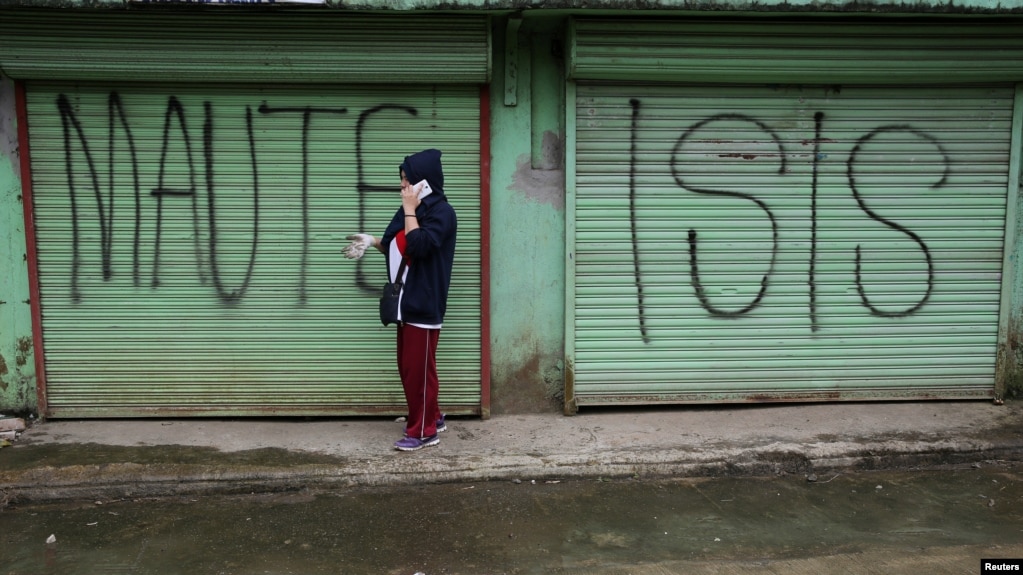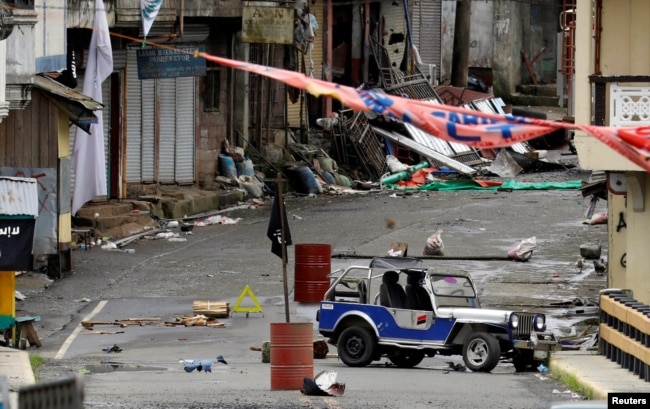
FILE - A person is seen using a mobile phone while passing a shuttered store front with "MAUTE-ISIS" graffiti, in Marawi city, southern Philippines, Oct. 20, 2017.
A group of Muslim rebels is retrenching in the Philippines for what could lead to another fight against the government after a five-month war last year.
Members of the Maute Group, an Islamic State-sympathetic, anti-government Muslim rebel front that sparked war in the southern city Marawi, have splintered into 10 smaller outposts since fighting ended in October, Philippine news website Rappler said this week. They number about 300 people.
The Philippine army is preparing in turn for more attacks. On January 30, the armed forces set up a camp in Marawi to “establish a strategic base in the city to prevent the reentry of Maute-ISIS-inspired terrorist groups,” the presidential office website says, using an alternate acronym for Islamic State.
Dedicated to ideology
The war last year killed core members the Maute family as well as its chief fighters - some 900 of the 1,127 dead - but left angry survivors, experts believe. Their reemergence shows that discontent over political control on the island of Mindanao, a historic Muslim tract in the majority Christian Philippines, festers despite decades of fighting. About 121,000 people have died from conflicts in Mindanao since the 1960s.
“The reality is that although the leaders have been decimated, there are still many sympathizers and remnants, the second and third liners, and it’s well known they’re dedicated to the ideology and they’re bound to the group,” said Eduardo Araral, associate professor in the National University of Singapore’s public policy school.
“And it’s just a matter of time, because there are many loose groups around Mindanao who could rally around the Maute-ISIS flags,” he said.

FILE - An Islamic State flag is seen pitched in an oil barrel during fighting last year between IS-affiliated Maute rebels and government forces in Marawi City, southern Philippines May 29, 2017.
Regrouping after war
When the five-year-old Maute Group joined hands with the Abu Sayyaf, a rebel force known for kidnapping and beheading foreign tourists, the armed forces started a war in May 2017. At least 200,000 people fled their homes as fighting made the lakeside university town uninhabitable. IS had picked an Abu Sayyaf leader as its emir for Southeast Asia, raising the danger level for Philippine officials.
One of two suspected Maute sympathizers arrested over the weekend in Manila allegedly led an attack against a civilian security detachment last year in Lanao Del Sur, the province surrounding Marawi, domestic news website ABS-CBN reported.
The Maute holdouts will try for now to find new leadership, perhaps giving the role to a cousin of the slain founders, said Herman Kraft, political science professor at the University of the Philippines Diliman in Metro Manila.
“There’s going to be some sort of struggle going on as to who’s going to take over the entire group,” Kraft said. “So everybody actually splintering might be something that’s going to go on for the next few months.”

FILE - Government soldiers are seen atop military vehicles during their assault against rebels from the Maute group, who last year took over large parts of Marawi City, southern Philippines, June 13, 2017.
Links to other rebels
With 19 other Muslim rebel groups active around Mindanao and the adjacent Sulu Sea, the revived Maute forces might pick some of them to resume their fight, analysts believe.
Rebels share the broad cause of securing Muslim autonomy in Mindanao, a farming and mining island of 21 million people, and more resources for relatively poor Muslim populations.
The New People’s Army, the armed unit of a communist insurgency, might help the Maute Group, said Enrico Cau, a Ph.D. student of international affairs and strategic studies at Tamkang University in Taiwan.
“I think they’re going to find a modus vivendi with the Moros, because they are very good friends,” Cau said, using a term for Philippine Muslims, often from minority ethnic groups. “If you apply socialist laws or regulations or principles to Islam, they work pretty well.”
Troops and national police are pushing members of the New People’s Army to surrender, President Rodrigo Duterte said Thursday in a statement on his web site. Duterte hopes the “armed forces can quash the rebel group soon,” he said.

FILE - Philippines President Rodrigo Duterte (C), flanked by military and civilian officials, talks after visiting soldiers, wounded in battles with Maute rebels, at a military camp in Cagayan De Oro, southern Philippines, June 11, 2017.
Aiming at ‘soft targets’
Foreign sympathizers of IS, an international terrorist outfit that was weakened last year at its bases in Iraq and Syria, might also reenter the Philippines to help the rebels again, Cau said. Philippine officials suspected that Indonesians and Malaysians reached Marawi last year to support the Maute rebels.
"High levels of unsolved grievances maximize the opportunity of success," in the Philippines, he said.
Maute survivors may not have the strength to fight a full-scale war but would turn to terrorist acts against “soft targets” such as schools and shopping malls in larger Mindanao cities, Araral said.
The government must give concessions to Muslim groups to ease fighting long term, Cau said.
A government commission is working toward an autonomy law following a peace deal with one of the more established rebel groups, the Moro Islamic Liberation Front.
https://www.voanews.com/a/philippines-maute-rebels/4287525.html

No comments:
Post a Comment
Note: Only a member of this blog may post a comment.